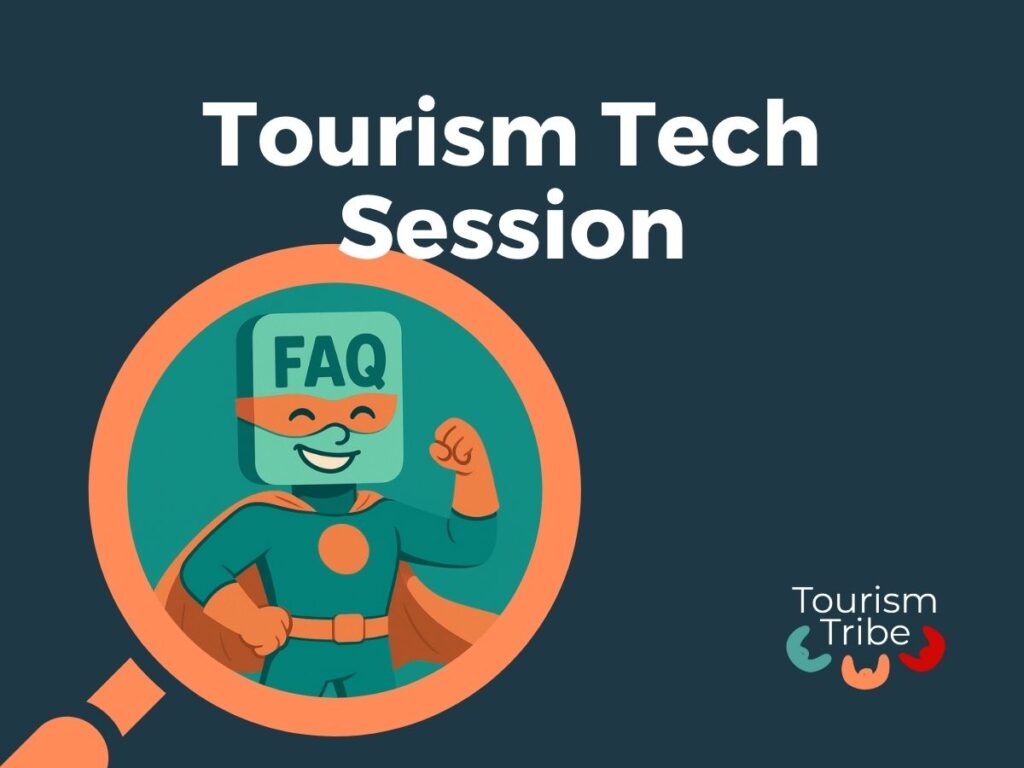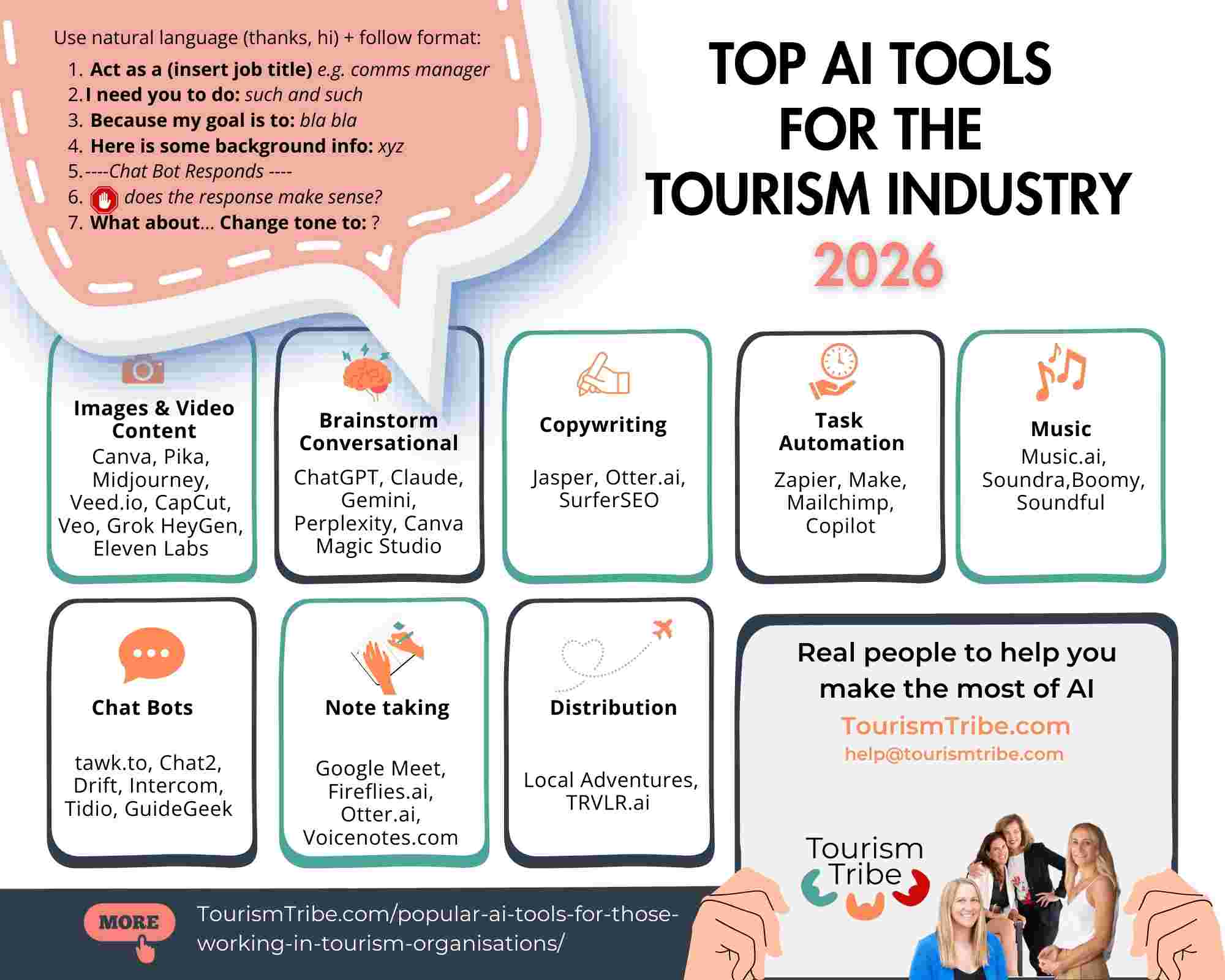
Let us help
Related articles
Tourism Tech Session Recap: Smarter FAQs for AI Search Visibility and Better Bookings
In this wrap-up of our latest Tourism Tech Session, we take a hands-on look at how FAQs (Frequently Asked Questions) can do more than answer the basics – they can help your business show up in AI search tools, reduce customer support load, and increase conversions.
If you’ve already read our previous blog, The Unsung Hero of Tourism Websites, think of this post as your follow-up workshop: we move beyond why FAQs matter, and focus on how to build and maintain them using real tools, smart strategies, and AI-powered techniques.
Missed the live session? Don’t worry!
If you’re a logged in Tourism Tribe member with a valid Digital Assistance Plan you’ll see the replay below. Login here. If you’re not a member, this article will walk you through the key takeaways, actionable strategies, and crucial insights shared.
What are Tourism Tech support sessions?
Our Tourism Tech Sessions are designed to support Digital Assistance members, whether you’re a direct member or a participant of one of our tourism digital capability programs. These sessions provide a space to:
- Learn the latest developments in tourism tech
- Ask questions in a safe, supportive environment
- Hear real-life examples and get practical demos
- Get the confidence to implement what you’ve learned
Why FAQs are a tech tool, not just a content section
We’re no longer in a world where FAQs sit forgotten at the bottom of your website. These days, they’re being pulled into Google’s AI Overview, voice assistants, and ChatGPT-style results.
Think of FAQs as your site’s signal boosters. They’re structured, clear, and focused on answering real-world questions. That makes them ideal for Generative Engine Optimisation (GEO), the evolving standard for AI search visibility.
And unlike blog posts, they’re quick to update, easier to test, and perfect for resolving customer hesitation.
Smart ways to source your questions (with AI help)
In our live demo, we showed how ChatGPT can build a bank of relevant FAQs by pulling patterns from your:
- TripAdvisor, Google, and Facebook reviews
- Booking emails or DM enquiries
- Website analytics (via Search Console or tools like AnswerThePublic)
This lets you stop guessing and start targeting the questions that actually matter to your audience.
You can also use ChatGPT prompts to group your questions by product, category, or audience type (e.g. families, solo travellers, mobility needs).
Here are a few of the actual prompts we demonstrated in the session to generate relevant FAQs:
- “Based on reviews from Google, TripAdvisor and Facebook, what are the most common questions people ask about [your business or experience]?”
- “Write 10 FAQs about [Tour Name or Experience] for first-time visitors based on common concerns and questions.”
- “Group the following questions into categories (e.g. logistics, accessibility, packing, pricing). Then suggest one or two extra FAQs for each category.”
- “Which customer objections are likely stopping people from booking [experience name]? Write FAQs that help address those.”
- “Rewrite these basic FAQs to sound more conversational and helpful, like a friendly tour guide.”
These prompts help you move beyond generic answers and tailor your FAQs to both your audience and the language AI tools understand.
Write FAQs that do a job (not just answer a question)
One of the biggest takeaways from the session was: don’t just answer questions, anticipate objections.
AI search engines are looking for clear, human-friendly answers. But your customers are looking for reassurance.
Write answers that:
- Sound like a friendly human, not a chatbot
- Link to helpful content when needed
- Reinforce your unique selling points (USPs)
- Subtly move the reader closer to booking
Use conversational phrasing and answer in full sentences. For example:
❌ “Check-in is from 2pm.”
✅ “You’re welcome to check in any time after 2pm. If you arrive early, we’ve got a guest lounge, luggage storage, and a shaded garden area where you can relax until your room is ready. Just let us know ahead of time so we can make you comfortable.”
❌ “9am”
✅ “Our rainforest walk begins at 9am sharp. Please arrive 15 minutes early so we can do a quick gear check and safety briefing.”
Schema markup: the ticket to AI visibility
If your FAQs aren’t marked up with schema, AI tools and search engines may ignore them.
So what is schema? Think of schema markup as a way of labelling your content behind the scenes, like adding a sticky note that says, “Hey Google, this is a question and answer.” It’s a bit of extra code that helps AI tools understand the purpose of your content, which is especially useful when it comes to FAQs.
When added properly, schema makes your answers more likely to show up directly in search results, voice assistants, and AI summaries. It tells the system what type of content you’ve provided, so your helpful answers don’t get lost in the noise.
The good news? You don’t need to know how to code.
SEO plugins like Rank Math, Yoast and others already offer FAQ blocks/widgets that work both with Gutenberg and other editors like Elementor.
If you want to use an advanced FAQ plugin with more features, we like Ultimate FAQ Accordion
If you’re on Wix, Squarespace etc you can look for apps and add ons that support the FAQ schema.
If all else fails, you can get AI to help you write the schema and add it to your website code.
To validate your schema, use a tool like Google’s Rich Results Test
Even if you have great content, schema is what makes it machine-readable.
Smarter placement = bigger impact
A major point raised during the session: location matters. If your FAQs are buried at the bottom of a single page, they won’t perform.
We encouraged:
- Adding targeted FAQs on product/tour pages
- Using categories or tags to organise FAQs by experience type
- Linking to relevant blog posts or policies in your answers
Example: A tour page about whale watching in Hervey Bay might include:
Q: Will I get seasick on the whale watching tour?
A: Most of our guests enjoy a smooth ride in the calm waters of Hervey Bay. If you’re concerned, we recommend sitting mid-deck and taking a ginger tablet before boarding. More tips here: [How to Prepare for Your First Whale Watching Tour]
This makes your page more helpful and more likely to appear in AI results.
Use FAQs to spark new content
As we showed live, great FAQs are also content goldmines. When a short answer just isn’t enough, turn it into:
- A detailed blog post
- A downloadable checklist
- A short video or story
Then link back to it in your FAQ. This builds your internal linking structure, which both Google and AI tools love.
Accessibility FAQs are essential (and often overlooked)
FAQs are a great place to showcase how inclusive your experiences are. For example:
Q: Can I bring my assistance dog?
A: Absolutely. We welcome certified assistance animals and can arrange extra space on our vessel if needed. Just let us know when you book.
This kind of content isn’t just helpful – it opens your business to a wider market, and often gets priority in AI-driven searches.
Tech tools that help
During the session we explored:
- AI tools (ChatGPT, Claude.ai) to generate draft FAQs
- Schema tools (Rank Math, Ultimate FAQ)
- Placement tools (Elementor widgets, Gutenberg blocks, shortcode-driven plugins)
- Audit tools (Google Rich Results Test, Schema Markup Validator)
Use these to create a streamlined FAQ workflow that’s easy to maintain and update.
Final thoughts
If you’ve already got your FAQ basics in place, this session was about levelling up: using AI to research and draft, adding schema for visibility, and placing FAQs in high-converting locations across your site.
Your FAQs shouldn’t just live on one page – they should live everywhere your customer needs reassurance, including product and services pages.
Need help implementing what we covered? Our tech support team can help write, structure, and set up schema-friendly FAQs that boost both bookings and visibility.
FAQs
Should my FAQ page be in the main navigation menu?
If your FAQ page is comprehensive and covers multiple areas (like booking, accessibility, safety, and policies), it can be useful to include it in your main navigation, especially if customers often have questions before they book. However, it’s even more important these days to place FAQs contextually on your product, service, and blog pages so they’re seen when they’re most relevant.
Should I add FAQs to my product pages?
Absolutely. This is one of the most effective places to use them. Adding tailored FAQs to your tour or accommodation pages helps reassure visitors, improves conversions, and boosts your chances of showing up in AI-powered search results. Keep them relevant to that specific product, and write them in a friendly, natural tone.
How to add an FAQ block in WordPress?
Most SEO plugins like Yoast, RankMath and SEO Press will have FAQ blocks that you can use either in Gutenberg or Elementor. Just look up the documentation of your SEO plugin.
Do I need coding skills to add schema?
Not at all. Most modern SEO tools like Yoast or Rank Math let you apply schema using simple blocks or toggles, no coding required.
How do I test if I have implemented the FAQ schema?
Visit Google’s Rich Results test and enter your FAQ URL. Then head over to Google Search Console (if you don’t know what that is you can refer to our Google Analytics course) to start seeing the FAQ schema being recognised in the backend.
Where to from here?
Top AI Tools for the Tourism Industry - Free cheatsheet

